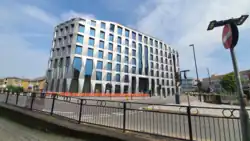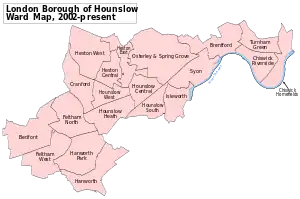Hounslow London Borough Council | |
|---|---|
 | |
| Type | |
| Type | |
| Leadership | |
Mayor of Hounslow | |
Leader of the Council | |
Chief executive | Niall Bolger since 18 September 2018 |
| Structure | |
| Seats | 60 councillors |
 | |
Political groups |
|
| Elections | |
| Plurality-at-large | |
Last election | 5 May 2022 |
Next election | 2026 |
| Meeting place | |
 | |
| Hounslow House, Hounslow | |
| Website | |
| www | |
Hounslow London Borough Council is the local authority for the London Borough of Hounslow in Greater London, England. It is a London borough council, one of 32 in the United Kingdom capital of London.
History

There have previously been a number of local authorities responsible for the Hounslow area. The current local authority was first elected in 1964, a year before formally coming into its powers and prior to the creation of the London Borough of Hounslow on 1 April 1965. Hounslow replaced the Municipal Borough of Brentford and Chiswick, the Municipal Borough of Heston and Isleworth and Feltham Urban District.[1]
It was envisaged that through the London Government Act 1963 Hounslow as a London local authority would share power with the Greater London Council. The split of powers and functions meant that the Greater London Council was responsible for "wide area" services such as fire, ambulance, flood prevention, and refuse disposal; with the local authorities responsible for "personal" services such as social care, libraries, cemeteries and refuse collection. As an outer London borough council it has been an education authority since 1965. This arrangement lasted until 1986 when Hounslow London Borough Council gained responsibility for some services that had been provided by the Greater London Council, such as waste disposal. Since 2000 the Greater London Authority has taken some responsibility for highways and planning control from the council, but within the English local government system the council remains a "most purpose" authority in terms of the available range of powers and functions.[2]
Powers and functions
The local authority derives its powers and functions from the London Government Act 1963 and subsequent legislation, and has the powers and functions of a London borough council. It sets council tax and as a billing authority also collects precepts for Greater London Authority functions and business rates.[3] It sets planning policies which complement Greater London Authority and national policies, and decides on almost all planning applications accordingly. It is a local education authority and is also responsible for council housing, social services, libraries, waste collection and disposal, traffic, and most roads and environmental health.[4]
See also
References
- ↑ Youngs, Frederic (1979). Guide to the Local Administrative Units of England. Vol. I: Southern England. London: Royal Historical Society. ISBN 0-901050-67-9.
- ↑ Leach, Steve (1998). Local Government Reorganisation: The Review and its Aftermath. Routledge. p. 107. ISBN 978-0714648590.
- ↑ "Council Tax and Business Rates Billing Authorities". Council Tax Rates. Retrieved 8 April 2020.
- ↑ "Local Plan Responses – within and outside London". Mayor of London. 12 November 2015. Retrieved 9 April 2020.
External links